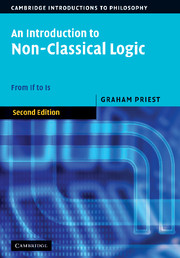Book contents
- Frontmatter
- Contents
- Preface to the First Edition
- Preface to the Second Edition
- Mathematical Prolegomenon
- Part I Propositional Logic
- 1 Classical Logic and the Material Conditional
- 2 Basic Modal Logic
- 3 Normal Modal Logics
- 4 Non-normal Modal Logics; Strict Conditionals
- 5 Conditional Logics
- 6 Intuitionist Logic
- 7 Many-valued Logics
- 8 First Degree Entailment
- 9 Logics with Gaps, Gluts and Worlds
- 10 Relevant Logics
- 11 Fuzzy Logics
- 11a Appendix: Many-valued Modal Logics
- Postscript: An Historical Perspective on Conditionals
- Part II Quantification and Identity
- Postscript: A Methodological Coda
- References
- Index of Names
- Index of Subjects
10 - Relevant Logics
Published online by Cambridge University Press: 05 June 2012
- Frontmatter
- Contents
- Preface to the First Edition
- Preface to the Second Edition
- Mathematical Prolegomenon
- Part I Propositional Logic
- 1 Classical Logic and the Material Conditional
- 2 Basic Modal Logic
- 3 Normal Modal Logics
- 4 Non-normal Modal Logics; Strict Conditionals
- 5 Conditional Logics
- 6 Intuitionist Logic
- 7 Many-valued Logics
- 8 First Degree Entailment
- 9 Logics with Gaps, Gluts and Worlds
- 10 Relevant Logics
- 11 Fuzzy Logics
- 11a Appendix: Many-valued Modal Logics
- Postscript: An Historical Perspective on Conditionals
- Part II Quantification and Identity
- Postscript: A Methodological Coda
- References
- Index of Names
- Index of Subjects
Summary
Introduction
10.1.1 In this chapter we look at logics in the family of main stream relevant logics. These are obtained by employing a ternary relation to formulate the truth conditions of →. In the most basic logic, there are no constraints on the relation. Stronger logics are obtained by adding constraints.
10.1.2 We also see how these semantics can be combined with the semantics of conditional logics of chapter 5 to give an account of ceteris paribus enthymemes.
The Logic B
10.2.1 N4 and N* are relevant logics, but, as relevant logics go, they are relatively weak. Many proponents of relevant logic have thought that the relevant logics of the last chapter are too weak, on the ground that there are intuitively correct principles concerning the conditional that they do not validate. A way to accommodate such principles within a possible-world semantics is to use a relation on worlds to give the truth conditions of conditionals at non-normal worlds. Unlike the binary relation of modal logic, xRy, though, this relation is a ternary, that is, three-place, relation, Rxyz.
10.2.2 Intuitively, the ternary relation Rxyz means something like: for all A and B, if A → B is true at x, and A is true at y, then B is true at z. What philosophical sense to make of this, we will come back to later.
Information
- Type
- Chapter
- Information
- An Introduction to Non-Classical LogicFrom If to Is, pp. 188 - 220Publisher: Cambridge University PressPrint publication year: 2008
